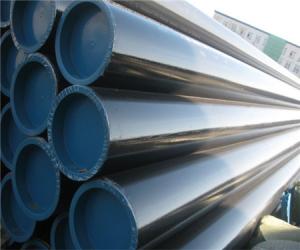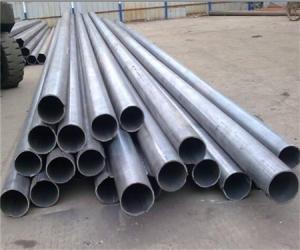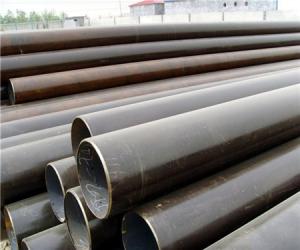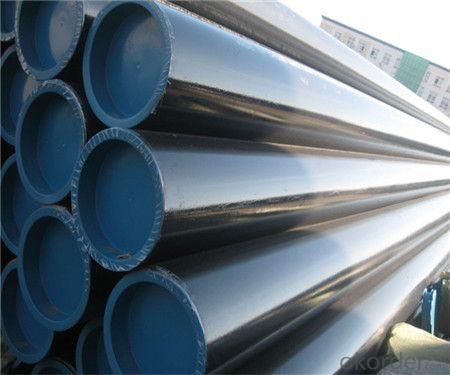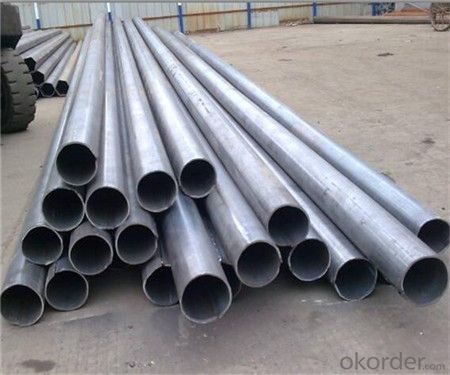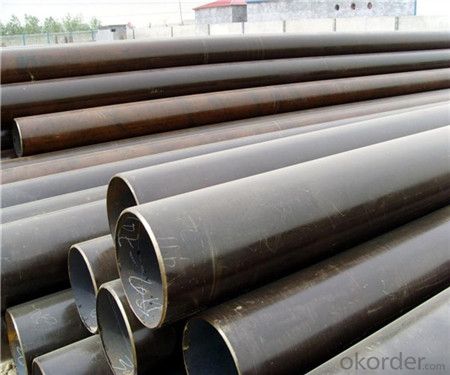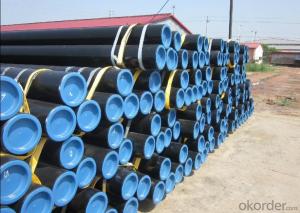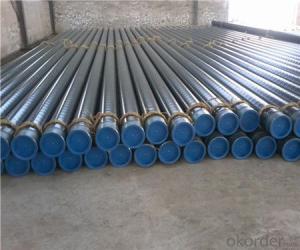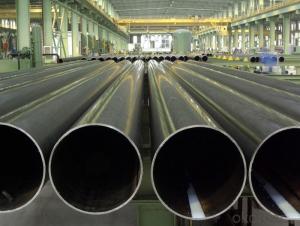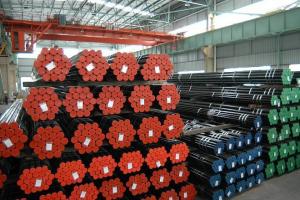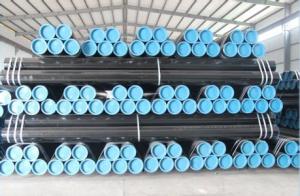ASME API 5L Structural Seamless Steel Pipe
- Loading Port:
- Tianjin
- Payment Terms:
- TT or LC
- Min Order Qty:
- 25 m.t.
- Supply Capability:
- 10000 m.t./month
OKorder Service Pledge
OKorder Financial Service
You Might Also Like
1、Structure of Welded Steel Tube:
Welded Steel Tube is formed by drawing a solid billet over a piercing rod to create the hollow shell. We are company that have many years experience and professional manager team and engineer team and sales team, sure we will provide you high quality of welded pipe and professioanl service. Our products are strictly in accordance with international and domestic standard. We test on every pipe before delivery. Any quality certification or testing report you want to see, please tell us. We aim to give your best service and hope to establish long-term business cooperation with you. Good quality and speedy delivery and patient after-sale service will help you make an easy purchase.
2、Main Features of the Welded Steel Tube:
• High manufacturing accuracy
• The higher strength
• The small inertia resistance
• Strong heat dissipation ability
• Good visual effect
• Satisfy price
3、Welded Steel Tube Specification:
Standard | GB, DIN, ASTM ASTM A106-2006, ASTM A53-2007 |
Grade | 10#-45#, 16Mn 10#, 20#, 45#, 16Mn |
Thickness | 8 - 33 mm |
Section Shape | Round |
Outer Diameter | 133 - 219 mm |
Place of Origin | Shandong, China (Mainland) |
Secondary Or Not | Non-secondary |
Application | Hydraulic Pipe |
Technique | Cold Drawn |
Certification | API |
Surface Treatment | factory state or painted black |
Special Pipe | API Pipe |
Alloy Or Not | Non-alloy |
Length | 5-12M |
Outer Diameter | 21.3-610mm |
Grade | 20#, 45#, Q345, API J55, API K55, API L80, API N80, API P110, A53B |
Standard | ASME, ASTM |
1) Material:20#(ASTM A 106/A53 GRB.API5LGRB,GB),45#,16Mn,10#.
2) Specification range:OD:21.3-610mm,WT:6-70mm,length:6-12m or according to the requirement of clients.
3) Excutive standards:GB,ASME API5L.ASTM A 106/A53,Despite of the above standards,we can also supply seamless steel pipe with standard of DIN,JIS,and so on,and also develop new products according to the requirements of our clients!
4) Surface:black lacquered,varnish coating or galvanized.
5) Ends:Beveled or square cut,plastic capped,painted.
6) Packing:bundles wrapped with strong steel strip,seaworthy packing.
4、Packaging & Delivery
Packaging Details: | seaworthy package,bundles wrapped with strong steel strip |
Delivery Detail: | 15-30days after received 30%TT |
5、FAQ of Welded Steel Tube:
①How is the quality of your products?
Our products are strictly in accordance with international and domestic standard. We test on every pipe before delivery. Any quality certification or testing report you want to see, please tell us.
Guaranteed: If products’ quality is not in accordance with description as we provide or the promise before you place order, we promise 100% refund.
②How about the price?
Yes, we are factory and be capable of offering you the lowest price. One of our policy is that “ to save time and be absolutely honest with our business relationship, we quote as low as possible for every client, and discount can be given according to the quantity”, if you are interested in bargain and dissatisfy our factory price, just don’t waste your time. Our quotation is professional.
③Why should you choose us?
Choice happens because of our quality and price. Additionally, we can also offer professional products inquiry, products knowledge train (for agents), fast goods delivery, outstanding customer solution proposals. Our service formula: good quality + good price + good service=customer’s trust.
SGS test is available. Customer inspection before shipping is welcome. Third party inspection is OK. We aim to give your best service and hope to establish long-term business cooperation with you. Good quality and speedy delivery and patient after-sale service will help you make an easy purchase.
6、 Welded Steel Tube Images:
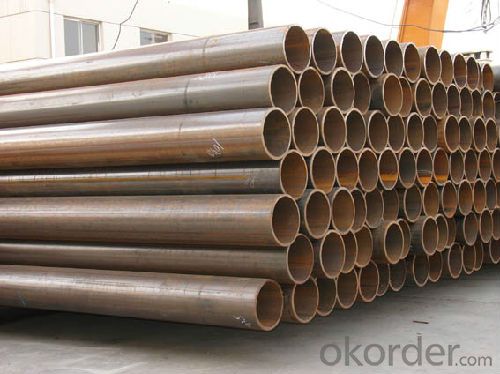
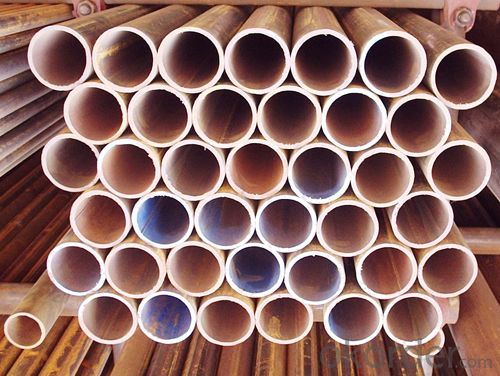
- Q: How are steel pipes used in the infrastructure development?
- Steel pipes are widely used in infrastructure development as they provide strength, durability, and versatility for various applications. They are commonly used in the construction of bridges, highways, and buildings as structural elements. Steel pipes are also used in water and sewage systems, as they have excellent corrosion resistance and can withstand high pressure. Additionally, steel pipes are used for transporting oil, gas, and other fluids, making them crucial for the energy industry. Overall, steel pipes play a vital role in the development and maintenance of infrastructure, ensuring its stability and functionality.
- Q: Who knows what is the difference between double submerged arc welded pipe and longitudinal submerged arc welding?
- The straight seam welding is relative to the spiral welding and the T-shaped welding, and so on.
- Q: What are the different methods of transporting steel pipes?
- The different methods of transporting steel pipes include using trucks, trains, ships, and pipelines. Trucks are commonly used for short-distance transportation, while trains and ships are used for long-distance transportation. In some cases, steel pipes can also be transported through pipelines, especially for oil and gas applications. Each method has its own advantages and considerations, such as cost, capacity, and accessibility.
- Q: What are the different types of steel pipe connections for steam pipelines?
- There are several types of steel pipe connections commonly used for steam pipelines. These include threaded connections, flanged connections, welded connections, and grooved connections. Each type has its own advantages and is chosen based on factors such as the pipe size, pressure, and temperature requirements, as well as the ease of installation and maintenance.
- Q: Can steel pipes be used for conveying oil?
- Yes, steel pipes can be used for conveying oil. Steel pipes are commonly used in the oil and gas industry for transporting oil due to their strength, durability, and resistance to corrosion. The high strength of steel pipes allows them to withstand the high pressure and temperature conditions that are often associated with oil transportation. Additionally, steel pipes are less prone to leakage and damage compared to other materials, making them a reliable choice for conveying oil over long distances. Moreover, the smooth interior surface of steel pipes helps to minimize friction and enhance the flow of oil. Overall, steel pipes are a preferred option for oil transportation due to their superior mechanical properties and long-term performance.
- Q: What are the different methods of pipe welding for steel pipes?
- There are several different methods of pipe welding for steel pipes, each with its own unique advantages and applications. Here are some of the most common methods: 1. Shielded Metal Arc Welding (SMAW): Also known as stick welding, SMAW is a manual welding process that uses a consumable electrode coated in flux. The electrode is melted to create the weld, and the flux creates a protective shield around the weld pool. SMAW is versatile and can be used in various positions, making it suitable for both field and workshop applications. 2. Gas Metal Arc Welding (GMAW): Commonly known as MIG (Metal Inert Gas) welding, GMAW uses a continuous wire electrode that is fed through a welding gun. The welding gun also supplies a shielding gas, such as argon or a mixture of argon and carbon dioxide, to protect the weld pool from atmospheric contamination. GMAW is known for its high welding speed and is often used in industrial applications. 3. Flux-Cored Arc Welding (FCAW): Similar to GMAW, FCAW uses a continuous wire electrode, but the wire is filled with flux instead of relying on an external shielding gas. The flux in the wire produces a protective shield around the weld pool, eliminating the need for a separate gas supply. FCAW is commonly used in outdoor and windy conditions as it provides better protection against atmospheric contamination. 4. Gas Tungsten Arc Welding (GTAW): Also known as TIG (Tungsten Inert Gas) welding, GTAW uses a non-consumable tungsten electrode to create the weld. The weld pool is protected by a shielding gas, typically argon, which is supplied separately. GTAW produces high-quality welds with excellent control, making it suitable for critical applications where precision is crucial. 5. Submerged Arc Welding (SAW): SAW is an automated welding process that uses a continuously fed wire electrode and a granular flux that is poured over the weld joint. The arc is submerged beneath the flux, providing excellent protection against contamination. SAW is commonly used in heavy fabrication and pipeline industries due to its high deposition rates and deep penetration capabilities. These are just a few of the different methods of pipe welding for steel pipes. The choice of method depends on factors such as the application, material thickness, desired weld quality, and available equipment. It is important to select the appropriate welding method to ensure strong, durable, and reliable welds in steel pipe applications.
- Q: What are the different wall thicknesses available for steel pipes?
- The different wall thicknesses available for steel pipes vary depending on the specific application and requirements. Common wall thicknesses for steel pipes include standard, extra strong, and double extra strong, with each thickness offering different levels of strength and durability.
- Q: What are the different types of steel pipe valves?
- Various industries and applications commonly utilize several types of steel pipe valves. Here, we present some of the most frequently used types: 1. Gate valves: These valves control fluid flow by raising or lowering a gate or wedge that obstructs the flow path. They ensure a tight seal when closed and are prevalent in applications requiring complete shut-off or full flow. 2. Globe valves: With a globe-shaped body and a movable plug or disc, these valves regulate fluid flow. They excel in throttling capabilities and find application in situations demanding precise flow control. 3. Ball valves: Fluid flow is managed by a rotating ball with a hole in these valves. Alignment of the hole with the pipe signifies full openness, while a perpendicular hole indicates closure. Ball valves are durable, reliable, and extensively used in swift and effortless shut-off applications. 4. Check valves: These valves allow fluid flow in only one direction, preventing backflow. They are instrumental in safeguarding pumps, compressors, and other equipment from reverse flow-induced damage. 5. Butterfly valves: Butterfly valves feature a rotating disc within the pipe to control fluid flow. They are lightweight, compact, and provide rapid shut-off. Butterfly valves are commonly employed in large-scale applications like water treatment and HVAC systems. 6. Plug valves: By utilizing a cylindrical or conical plug, plug valves regulate flow within the valve body. Their simple design, ease of operation, and dependable shut-off capabilities make them prevalent in applications requiring frequent operation and high pressure ratings. 7. Diaphragm valves: These valves employ a flexible diaphragm to manage fluid flow. Pressing the diaphragm against the valve seat blocks flow, while lifting it allows flow. Diaphragm valves are frequently used in environments requiring sterility or hygiene. These examples illustrate the variety of steel pipe valves available in the market. The choice of valve depends on specific requirements, including flow rate, pressure, temperature, and the nature of the transported fluid.
- Q: What is PE coated steel pipe? Seek explanation
- PE coating on the inner wall of steel pipe steel pipe is covered with a layer of polyethylene plastic polymer, PE, polyethylene (Polyethylene of raised temperature is the abbreviation of resistance English), the scope of application of the general PE pipe water supply pipe to a temperature below 40 DEG C, cannot be used for hot water transmission pipeline.
- Q: How do steel pipes perform in seismic zones?
- Steel pipes perform well in seismic zones due to their high strength and ductility. They have the ability to absorb and distribute seismic energy, which helps in reducing the impact of earthquakes. Additionally, steel pipes are resistant to damage and deformation during seismic events, making them a reliable choice for infrastructure in earthquake-prone areas.
Send your message to us
ASME API 5L Structural Seamless Steel Pipe
- Loading Port:
- Tianjin
- Payment Terms:
- TT or LC
- Min Order Qty:
- 25 m.t.
- Supply Capability:
- 10000 m.t./month
OKorder Service Pledge
OKorder Financial Service
Similar products
Hot products
Hot Searches
Related keywords
